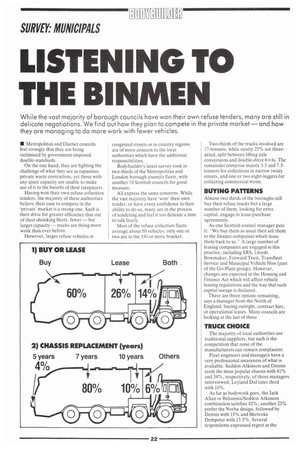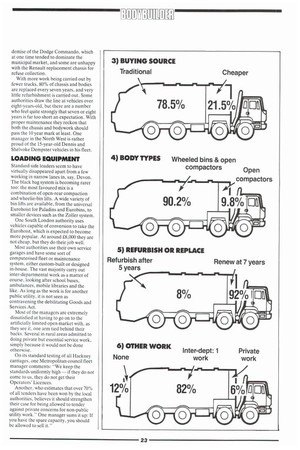LISTENING TO THE BINM
Page 162

Page 163

If you've noticed an error in this article please click here to report it so we can fix it.
While the vast majority of borough councils have won their own refuse tenders, many are stili in delicate negotiations. We find out how they plan to compete in the private market—arid how they are managing to do more work with fewer vehicles.
• Metropolitan and District councils feel strongly that they are being victimised by government-imposed double-standards.
On the one hand, they are fighting the challenge of what they see as rapacious private waste contractors, yet those with any spare capacity are unable to make use of it to the benefit of their ratepayers.
Having won their own refuse collection tenders, the majority of these authorities believe their case to compete in the 'private' market is a strong one. Such is their drive for greater efficiency that out of their shrinking fleets, fewer — but larger capacity — trucks are doing more work than ever before.
However, larger refuse vehicles in congested streets or in country regions are of more concern to the local authorities which have the additional responsibilities.
Bodybuilder's latest survey took in two-thirds of the Metropolitan and London borough councils fleets, with another 19 Scottish councils for good measure.
All express the same concerns. While the vast majority have 'won' their own tender, or have every confidence in their ability to do so, many are in the process of tendering and feel it too delicate a time to talk freely.
Most of the refuse collection fleets average about 50 vehicles: only one or two are in the 150 or more bracket. Two-thirds of the trucks involved are 17-tonners, while nearly 25% are threeaxled, split between lifting axle conversions and double-drive 6 x 4s. The remainder comprise mainly 3.5 and 7.5tonners for collections in narrow twisty streets, and one or two eight-leggers for collecting commercial waste.
BUYING PATTERNS
Almost two thirds of the boroughs still buy their refuse trucks but a large number of them, looking for extra capital, engage in lease-purchase agreements.
As one Scottish council manager puts it: "We buy them as usual then sell them to the finance companies which lease them back to us." A large number of leasing companies are engaged in this practice, including SRS, Lloyds Bowmaker, Forward Trust, Transfleet Service and Municipal Vehicle Hire (part of the Go-Plant group). However, changes are expected in the Housing and Finance Act which will affect vehicle leasing regulations and the way that such capital useage is declared.
There are three options remaining, says a manager from the North of England: buying outright, contract hire, or operational leases. Many councils are looking at the last of these.
TRUCK CHOICE
The majority of local authorities use traditional suppliers, but such is the competition that none of the manufacturers can remain complacent Fleet engineers and managers have a very professional awareness of what is available. Seddon Atkinson and Dennis seem the most popular chassis with 41% and 34%, respectively, of those managers interviewed, Leyland Daf rates third with 10%.
As far as bodywork goes, the Jack Allan or Britannia/Seddon Atkinson combination satisfies 42%; another 23% prefer the Norba design, followed by Dennis with 15% and Shelvoke Dempster with 13.5%. Several respondents expressed regret at the demise of the Dodge Commando, which at one time tended to dominate the municipal market, and some are unhappy with the Renault replacement chassis for refuse collection.
With more work being carried out by fewer trucks, 80% of chassis and bodies are replaced every seven years, and very little refurbishment is carried out. Some authorities draw the line at vehicles over eight-years-old, but there are a number who feel quite strongly that seven or eight years is far too short an expectation. With proper maintenance they reckon that both the chassis and bodywork should pass the 10 year mark at least. One manager in the North West is rather proud of the 15-year-old Dennis and Shelvoke Dempster vehicles in his fleet.
LOADING EQUIPMENT
Standard side loaders seem to have virtually disappeared apart from a few working in narrow lanes in, say, Devon. The black bag system is becoming rarer too: the most favoured mix is a combination of open-rear compaction and wheelie-bin lifts. A wide variety of bin lifts are available, from the universal Eurohoist for Paladins and Eurobins, to smaller devices such as the Zoller system.
One South London authority uses vehicles capable of conversion to take the Eurohoist, which is expected to become more popular. At around £8,000 they are not cheap, but they do their job well.
Most authorities use their own service garages and have some sort of computerised fleet or maintenance system, either custom-built or designed in-house. The vast majority carry out inter-departmental work as a matter of course, looking after school buses, ambulances, mobile libraries and the like. As long as the work is for another public utility, it is not seen as contravening the debilitating Goods and Services Act.
Most of the managers are extremely dissatisfied at having to go on to the artificially limited open market with, as they see it, one arm tied behind their backs. Several in rural areas admitted to doing private but essential service work, simply because it would not be done otherwise.
On its standard testing of all Hackney carriages. one Metropolitan council fleet manager comments: "We keep the standards uniformly high — if they do not come to us, they do not get their Operators' Licences.
Another, who estimates that over 70% of all tenders have been won by the local authorities, believes it should strengthen their case for being allowed to tender against private concerns for non-public utility work." One manager sums it up: If you have the spare capacity, you should be allowed to sell it.''
















































































































































































